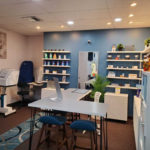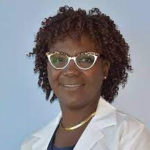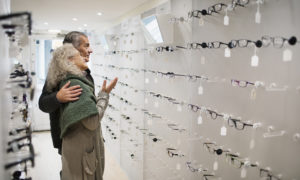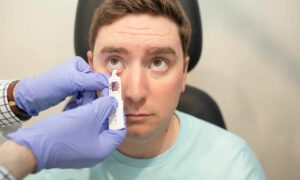
The reception area of Dr. Dune’s practice. Dr. Dune says that she found inspiration in a few key books and a podcast for succeeding as a small business owner.
By Barbara Dune, OD
July 27, 2022
Books and other media, like podcasts, can change our perspective. Here are a few books and a podcast that empowered me to launch and grow my practice, which I started cold a year and a half ago, and am already working to expand medical eyecare services within.
Good to Great: Why Some Companies Make the Leap and Others Don’t
By Jim Collins
Collins talks about Level 5 Leadership in which the leader of a business that becomes impressively successful keeps their eye on the good of the organization rather than on self-aggrandizement. As a modest, soft-spoken person, this book taught me that you don’t have to be bold and brash to be a successful in business. In fact, according to this book, a leader who de-emphasizes themselves, and, instead, focuses on the organization, is in a superior position.
The leaders of many of the companies profiled in “Good to Great” were not well known, yet their companies were household names. This concept of humble leadership taught me to maintain a team mindset in my practice management. Collins notes the importance of having the right team in place–that success happens not because of one, effective leader, but a successful team. As Collins puts it, you need to “get the right people on the bus” to get to your desired destination.
I currently have three support staff members, who also value working as a collaborative team. That means that while I call out individual achievement among staff members, I make a point of showing staff how those individual achievements work together with my own efforts to create a profitable practice. When I hire employees, I look for individuals who want to grow with my practice, expanding the skills they can contribute. For example, one of my employees is currently studying to become a licensed optician.
Black Man in a White Coat: A Doctor’s Reflections on Race and Medicine
By Damon Tweedy, MD
I was raised in Uganda, where the experience of being a Black person is much different from the African-American experience. This book helped me understand, not just African-American culture, but to have a greater sympathy and understanding for all cultures that are different from the one I was raised in.
In Africa, a person who is a doctor is accepted by almost all patients as an authority figure. As such, doctors generally have success giving instructions in a top-down fashion. In the U.S., I noticed that some patients, including many of my African-American patients, do not respond well to this authoritative approach.
For instance, when I first started practicing, I may have come across as more judgmental than understanding when working with diabetic patients. I would let them know the damage their uncontrolled diabetes was doing to their eyes, and would direct them to work harder to control their blood sugar.
Now, when I have a diabetic patient with uncontrolled blood sugar, and diabetic eye disease, who failed to make it to their last appointment, I ask what happened and how I can help. They might tell me they had a sick child at home or another difficulty that kept them from returning for care. They might also share with me the difficulties they are experiencing following their primary care provider’s or nutritionist’s dietary guidelines. Now I take the approach of presenting myself as a friend who wants to help them, rather than as an authority figure who wants to give them instructions.
Other Articles to Explore
I learned from Tweedy that a doctor has to continuously reach out to learn about the patient populations arriving at their office. I work with the Connecticut Association of Optometrists on a community outreach initiative I lead, Focus on Eyes, to visit minority populations to educate on the importance of eye health. I talk to these communities about what I do as an optometrist and how my colleagues and I can help them. I also find that in educating people about optometry, I sometimes inspire a young person from a minority community to learn about becoming an optometrist themselves.
Losing My Virginity: How I Survived, Had Fun, and Made a Fortune Doing Business My Way
By Richard Branson
The ability to dream big–and take actions to make those dreams come true–is what Branson taught me in this book, in which he details the founding and growth of his business empire, including Virgin Megastores, Virgin Records music label, Virgin Atlantic airline, Virgin Rail Group, and more recently, Virgin Galactic, a space flight corporation.
Branson was more afraid not to try than to fail. He seemed to feel that if you’re passionate enough, believe you can do it, and do the work to get there, then it’s worth giving your dream a shot.
I dreamed of becoming a practice owner for years before I finally took a chance and did it. I worked previously for an optical shop with little-to-no medical eyecare services. I knew I wanted my career to be more than refractions and contact lens fittings. I had job security and comfort where I was, but I knew it wasn’t my dream.
When I launched my practice 18 months ago, I planned to have much more than an optical shop and contact lens fittings. I knew I wanted to create a practice with full-scope medical eyecare. In my still-young practice, I am already seeing a swift increase in patients coming for appointments to address conditions like dry eye, diabetes, glaucoma and other medical eyecare concerns.
I am working toward developing a med-spa with intense pulse light (IPL) technology and other advanced dry eye treatments. My goal is to create an advanced medical eyecare practice that has a relaxing spa atmosphere.
Business Wars
a podcast series by David Brown
Companies have to go up against each other. Why are some winners and other losers? It’s not necessarily the biggest and most powerful companies that continue to thrive. It’s often the companies you wouldn’t have bet on that come up with innovative ways to compete.
For example, streaming services, like Netflix, have triumphed over traditional network TV in many cases. Now the more established companies, the old television networks, have launched streaming services of their own to compete. The consistent lesson I have taken away from Brown’s series is the importance of being able to quickly pivot and adapt to a changing marketplace.
Rather than continuing to focus on refraction and sales of eyewear and contact lenses, optometrists are continuing to thrive by embracing medical eyecare. We continue to add advanced technology to our practices that take us far beyond the optical shops of the old days.
Staying ready to adapt to changing market conditions requires professionals to continuously learn about what’s on the horizon, and then seek out ways to learn new needed skills. I try to stay on the cutting-edge of medical eyecare knowledge, and whenever new technology is developed, I research it and consider how, if right for my practice, I could bring it to the patient care I deliver.
Getting too comfortable in a particular mode, or level, of practice means that you are limiting yourself and possibly dooming your practice to long-term failure as competitors bring new services to the marketplace.
 Barbara Dune, OD, of Serenity I Care in Hartford, Conn. To contact her: dunevision2020@gmail.com
Barbara Dune, OD, of Serenity I Care in Hartford, Conn. To contact her: dunevision2020@gmail.com

























